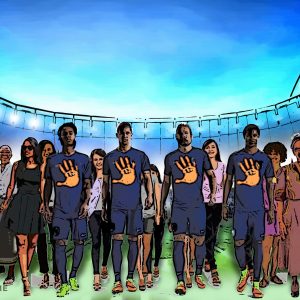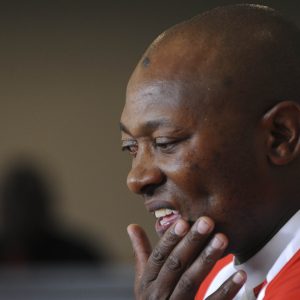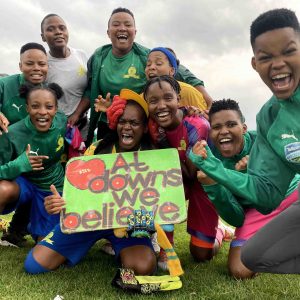Kick4life, more than a footballing club
The Lesotho outfit is set to become the first professional football club in the world to pay its women players the same as the men’s side next year. But that’s not the only thing they are doing.…
Author:
7 September 2020

In a world where women are marginalised in the workplace and society in general (and routinely excluded financially), Kick4life is defying the odds. Dedicated to social change, the Lesotho outfit is more than just a football club, it advocates and contributes towards gender equality. The club also sponsors players with fees and scholarships for their studies.
From 2021, Kick4life will be the first top flight club in the world to offer gender-equal budgets. The women’s team will earn the same wages as the men’s side. The men’s team play in the Lesotho Premier League, while the women play in the Super League. These are top divisions of professional football in the mountain kingdom, for men and women respectively.
“The introduction of equal budgets is a step forward in empowering women,” says Puky Ramokaotsi, manager of Kick4life women’s team. “It further empowers the work that we already do to combat gender inequality.”
Related article:
For Ramokaotsi, her Kick4life journey is personal. She has been with them for 10 years, first as a player. She now runs the club’s programmes, among other duties. “It’s funny because when I joined the club as a player in 2010, we didn’t even have a full team,” she said.
The Kick4life women’s team is one of the founding members of the Lesotho Super League. Even though at some point they didn’t have enough to fill the quota for a starting XI, they won the Women’s Super League in 2018.
“It was just seven players [at the beginning] but we would always manage to gather a full team when we had to play.”
The players were required to join the life skills programme the club offered, something Ramokaotsi wasn’t interested in at the time. “I just wanted to play football,” she says. Little did she know that the programmes would be a life changer for her.
Related article:
As she attended the sessions, she discovered a programme called the Coaches Story where coaches shared their personal journeys. The space allowed her to share a story she hadn’t shared with anyone.
“I was raped in 2013 and back then I did not speak out. However, I knew I didn’t want other girls to suffer in silence and I decided to be part of the programmes,” said Ramokaotsi, who first started as a volunteer.
The gender-based violence programme is not the only one that was personal to her. Ramokaotsi’s aunt was HIV positive when she passed away.
“I stigmatised my aunt because I was not educated on the virus. I think the HIV teaching and learning we give is important,” she says.
A long time coming
“It is important to empower women through football,” says Chris Bullock, former director at Kick4Life. He has since moved to an advisory role. Bullock has been at the club for seven years and was instrumental in developing the club’s programmes.
“Being at the club for seven years, the gender-equal budgets concept has always been in the works and it’s the direct result of focusing on the women’s team over the past years and developing and framing the programmes around women empowerment.”
In 2019, the United States women’s national football team (USWNT) filed a lawsuit against the US Soccer Federation demanding equal play. Their lawsuit was dismissed by the court. This despite the women’s team winning the Women’s World Cup four times and having five Olympic gold medals. The US men’s team has never won a World Cup.
Related article:
The US federation stated that the job of a male footballer on the national team “requires a higher level of skill based on speed and strength” than their female counterparts. Prior to the lawsuit, five USWNT players filed a wage-discrimination suit through the equal employment opportunity. The team was being paid 40% less than what their male counterparts were making. After a multi-year dispute, it was decided that till 2021, the women’s team will receive larger bonuses and greater financial support.
This gender imparity is not only happening to national teams. In 1988, when Manchester City founded their women’s team they were hailed for changing the landscape of women’s football. However, their women’s team earns 88 percent less than their male counterparts. Other big teams in the English premier league such as Arsenal, Liverpool and Everton have similarly large disparities.
South Africa’s senior women’s national team, Banyana Banyana, has also been fighting for better pay. The side is paid peanuts compared to their male counterparts. Sometimes they have to fight and complain to be paid those peanuts and other bonuses promised to them. Brazil recently announced that they would pay their senior national teams equally. They joined Australia, Norway and New Zealand.
Leading the way in gender equality
“Kick4life does a lot of work for women’s rights and this sends a statement to the world footballing world especially as a top flight club that has a men’s league and a women’s league and we are hoping that it can potentially set a trend for other clubs to follow and play their part in equality,” said Bullock.
“Women’s football is growing and not just in Lesotho. And in the environment today where women’s football is growing, it is important that we speak about gender equality through football and if we can show that in a sport that’s always been a men’s-dominated sport successfully then that is a win.”
Related article:
Bullock hails the work the club has done with the Girls United programme. The programme was started to fight gender-based violence. It is a fun and interactive activity-based programme with 12 sessions delivered by trained coaches. The programme is for 13-19-year olds in and out of school. The main aim of the programme is to use the power of football and sports to empower vulnerable girls and women with knowledge and skills to manage key challenges in their lives. They focus on gender rights, life skills development, sexual health education and HIV prevention.
“I want girls to know that football is just not a hobby but can be a career too,” says Ramokaotsi. “I want to see other clubs adopt this concept as well. I do not like the term ‘women’s football’ because in other sports, it is not gender specific so I would also like to see a do away with that term.”




